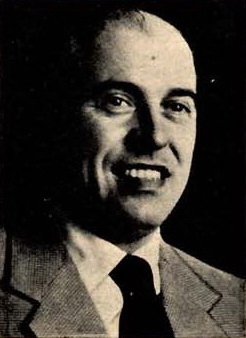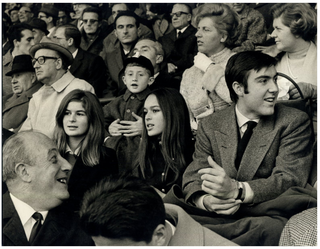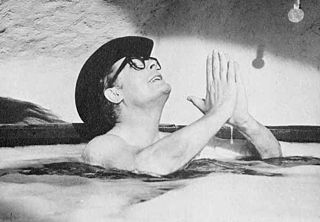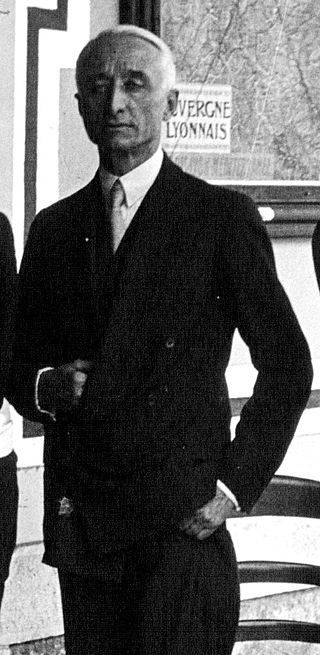Related Research Articles

The cinema of Italy comprises the films made within Italy or by Italian directors. Since its beginning, Italian cinema has influenced film movements worldwide. Italy is one of the birthplaces of art cinema and the stylistic aspect of film has been one of the most important factors in the history of Italian film. As of 2018, Italian films have won 14 Academy Awards for Best Foreign Language Film as well as 12 Palmes d'Or, one Academy Award for Best Picture and many Golden Lions and Golden Bears.

Silvana Mangano was an Italian film actress. She was one of a generation of thespians who arose from the neorealist movement, and went on to become a major female star, regarded as a sex symbol for the 1950s and '60s. She won the David di Donatello for Best Actress three times – for The Verona Trial (1963), The Witches (1967), and The Scientific Cardplayer (1972) – and the Nastro d'Argento for Best Actress twice.

Agostino "Dino" De Laurentiis was an Italian film producer and businessman who held both Italian and American citizenship. Following a brief acting career in the late 1930s and early 1940s, he moved into film production; alongside Carlo Ponti, he brought Italian cinema to the international scene in the post-World War II period. He produced or co-produced over 500 films, with 38 of his Hollywood films receiving Academy Award nominations. He was also the creator and operator of DDL Foodshow, a chain of Italian specialty foods stores.

Embassy Pictures Corporation was an American independent film production and distribution studio, which was active from 1942 to 1986. Embassy was responsible for films such as The Graduate, The Producers, The Fog, The Howling, Escape from New York, and This Is Spinal Tap, Swamp Thing, and television series such as The Jeffersons, One Day at a Time and The Facts of Life.

Carlo Fortunato Pietro Ponti Sr. was an Italian film producer with more than 140 productions to his credit. Along with Dino De Laurentiis, he is credited with reinvigorating and popularizing Italian cinema post-World War II, producing some of the country's most acclaimed and financially-successful films of the 1950s and 1960s.

Bitter Rice is a 1949 Italian neorealist crime drama film directed and co-written by Giuseppe De Santis, produced by Dino De Laurentiis, and starring Vittorio Gassman, Doris Dowling, Silvana Mangano, and Raf Vallone. The story follows a pair of fugitives, who hide among the rice fields of northern Italy. The Italian title of the film is based on a pun; since the Italian word riso can mean either "rice" or "laughter", riso amaro can be taken to mean either "bitter laughter" or "bitter rice".

War and Peace is a 1956 epic historical drama film based on Leo Tolstoy's 1869 novel of the same name. It is directed and co-written by King Vidor and produced by Dino De Laurentiis and Carlo Ponti for Paramount Pictures. The film stars Audrey Hepburn as Natasha, Henry Fonda as Pierre, and Mel Ferrer as Andrei, along with Vittorio Gassman, Herbert Lom, Oskar Homolka, Anita Ekberg in one of her first breakthrough roles, Helmut Dantine, Barry Jones, Anna Maria Ferrero, Milly Vitale and Jeremy Brett. The musical score was composed by Nino Rota and conducted by Franco Ferrara.

Attila is a 1954 Italian-French co-production, directed by Pietro Francisci and produced by Dino De Laurentiis and Carlo Ponti for Lux Film. Based on the life of Attila the Hun, it stars Anthony Quinn as Attila and Sophia Loren as Honoria, with French leading man Henri Vidal as the Hun's antagonist, Flavius Aetius. Irene Papas, in the second of three contract pictures for Lux Film, plays one of Attila's wives, Grune. Ettore Manni, Christian Marquand, and Claude Laydu are among the supporting cast of mostly French and Italian actors. American actor Scott Marlowe made his screen debut in the film. Along with The Pride and the Passion and Houseboat, it was one of Loren's biggest box-office successes during the 1950s.
De Laurentiis Entertainment Group (DEG) was an entertainment production company and distribution studio founded by Italian producer Dino De Laurentiis. The company is notable for producing Manhunter, Blue Velvet, the horror films Near Dark and Evil Dead II, King Kong Lives, and Bill & Ted's Excellent Adventure, as well as distributing The Transformers: The Movie.

Cops and Robbers is a 1951 Italian cult comedy film directed by Steno and Mario Monicelli. It stars the famous comedian Totò, and the cinematographer was the future film director Mario Bava. It was produced by Dino De Laurentiis and Carlo Ponti.

Maria Grazia Buccella is an Italian actress, glamour model and beauty pageant titleholder who was crowned Miss Italia 1959 and represented her country at Miss Universe 1959.

Sardinian Vendetta is a 1952 Italian comedy film directed by Mario Mattoli and starring Walter Chiari, Carlo Croccolo and Giovanna Pala. It as shot at the Icet Studios in Milan and the Ponti-De Laurentiis Studios in Rome. The film's sets were designed by the art director Alberto Boccianti.

Les Miserables is a 1948 Italian drama film directed by Riccardo Freda. It is based on the Victor Hugo's 1862 novel Les Misérables and stars Gino Cervi as Jean Valjean, Valentina Cortese as Fantine and Cosette, and Hans Hinrich as Javert. After the financial success of Freda's previous film The Black Eagle, Freda worked a deal with Lux Film and began developing an adaptation of Les Misérables with Mario Monicelli, Vittorio Nino Novarese and Stefano Vanzina. The film was shot entirely in Rome.

Raffaella De Laurentiis is an Italian film producer. Films that she has produced include Conan the Barbarian, Conan the Destroyer, Dune, Prancer, Dragon: The Bruce Lee Story, all films in the Dragonheart series, The Forbidden Kingdom and Kull the Conqueror.
The Nastro d'Argento is a film award assigned each year, since 1946, by Sindacato Nazionale dei Giornalisti Cinematografici Italiani, the association of Italian film critics.

The list of the A hundred Italian films to be saved was created with the aim to report "100 films that have changed the collective memory of the country between 1942 and 1978". Film preservation, or film restoration, describes a series of ongoing efforts among film historians, archivists, museums, cinematheques, and nonprofit organization to rescue decaying film stock and preserve the images they contain. In the widest sense, preservation assures that a movie will continue to exist in as close to its original form as possible.
Valerio Jalongo is an Italian film director and screenwriter.

Riccardo Gualino was an Italian business magnate and art collector. He was also a patron and an important film producer. His first business empire was based on lumber from Eastern Europe and included forest concessions, lumber mills, ships and warehouses. The highly leveraged structure collapsed in 1912–13. Gualino was also involved in manufacturing and distributing cement, and during World War I (1914–18) built and operated cargo ships carrying goods such as coal from the United States to Europe. After the war he was engaged in many enterprises, some in partnership with Giovanni Agnelli of FIAT. His activities included banking, manufacture of rayon, confectionery, chemicals and artificial leather.
Luigi Agostino Alfredo De Laurentiis was an Italian film producer. His credits include Un borghese piccolo piccolo, Amici miei – Atto II, Vacanze di Natale and Donne con le gonne.
Pier Giuseppe Gurgo-Salice (1894–1974), generally credited as Pierre Gurgo-Salice, was an Italian film producer. He was a senior figure at Lux Film, an Italian film production company that specialised in co-productions with France where Lux had a subsidiary. His brother Ermanno Gurgo-Salice headed production in France.
References
- 1 2 Gian Piero Brunetta, Jeremy Parzen The History of Italian Cinema: a Guide to Italian Film From its Origins to the Twenty-First Century, 2009, Princeton & Woodstock: Princeton University Press, p. 71, 117
- ↑ John Francis Lane Obituary: Carlo Ponti, The Guardian, 11 January 2007
- ↑ Obituary: Dino De Laurentiis, The Telegraph, 11 November 2010
- ↑ John Exshaw Obituary: Dino De Laurentiis, The Independent, 12 November 2010
- ↑ John Francis Lane Obituary: Dino De Laurentiis, The Guardian, 11 October 2010
- 1 2 Gregory D. Black The Catholic Crusade Against the Movies, 1940-1975, Cambridge: Cambridge University Press, 1998, p. 90
- ↑ Pauline Small Sophia Loren: Moulding the Star, Bristol (UK) & Chicago: Intellect Books, p. 37, n. 8
- ↑ Henry Bacon Visconti: explorations of beauty and decay, Cambridge University Press, 1998, p. 71
- ↑ Gianni Volpi "Lux" in Ginette Vincendeau (ed) Encyclopedia of European Cinema, London: Cassell/BFI, 1995, p. 270
